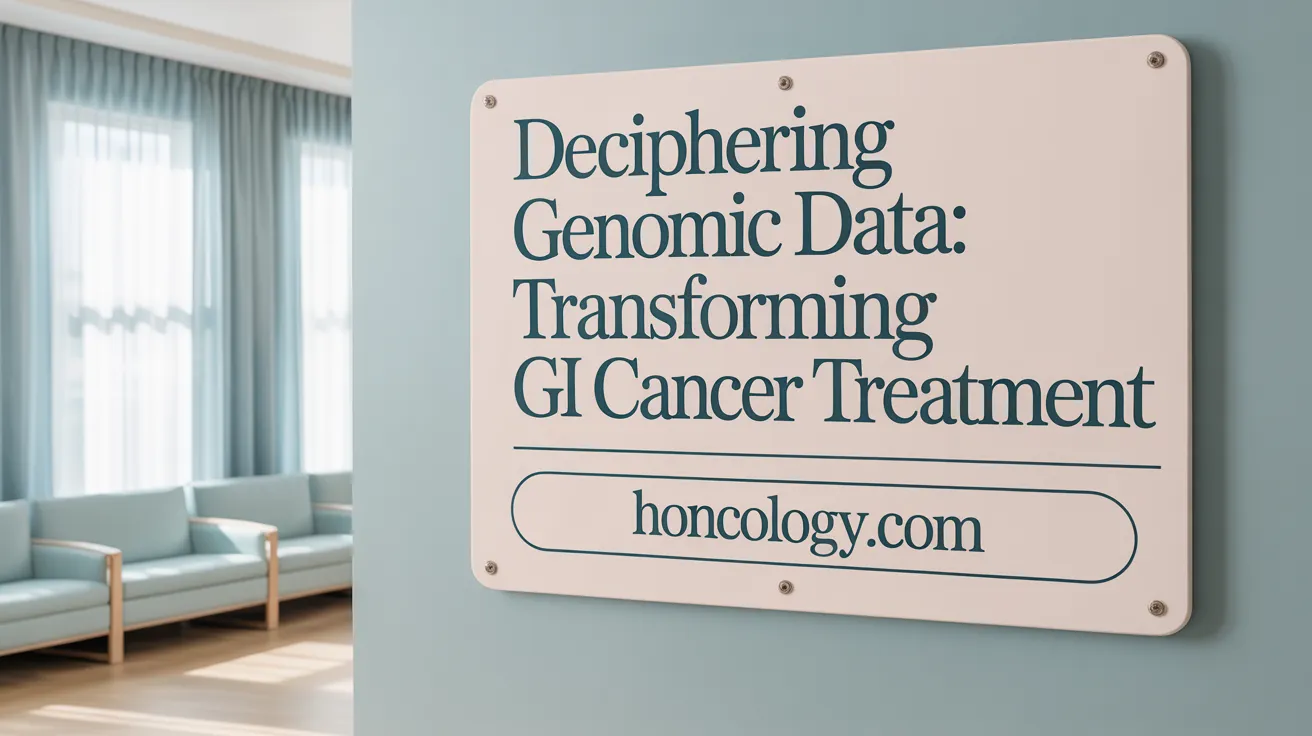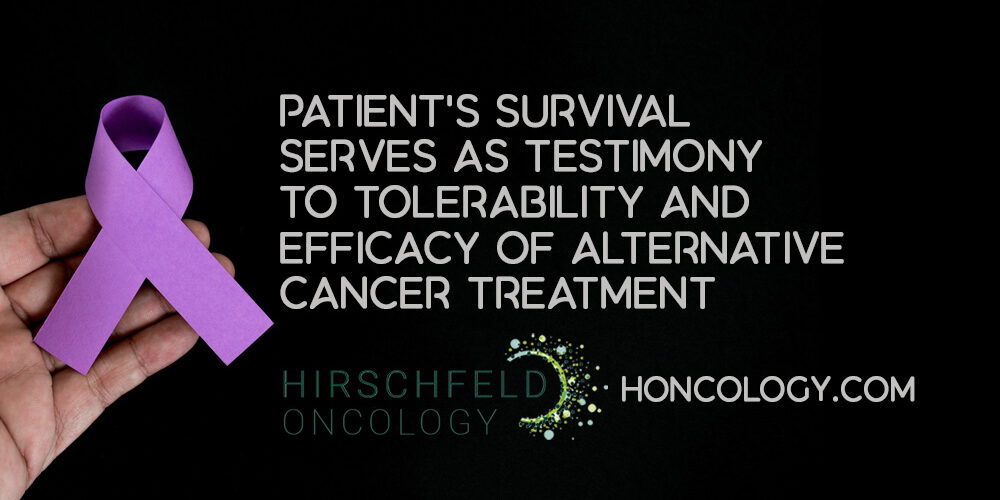Introduction to Genomic Profiling in Gastrointestinal Cancer
Overview of Gastrointestinal Cancers
Gastrointestinal (GI) cancers encompass malignancies of the digestive system, including organs such as the esophagus, stomach, pancreas, liver, gallbladder, small and large intestines, rectum, and anus. These cancers account for a significant proportion of global cancer incidence and mortality, with colorectal cancer being the most common subtype. The complexity and variability of GI tumors in terms of location, histology, and molecular features make personalized treatment a critical component of effective care.
Importance of Genomic Profiling in Cancer Treatment
Advances in genomic profiling have transformed the management of GI cancers by enabling precise identification of genetic mutations and molecular alterations that drive tumor growth and therapy resistance. Techniques like next-generation sequencing (NGS) provide comprehensive insights into individual tumor biology, uncovering actionable mutations in genes such as KRAS, BRAF, TP53, and PIK3CA across different GI cancer types. This molecular understanding supports tailored therapies—ranging from targeted agents to immunotherapies—that improve outcomes while minimizing toxicity. Moreover, genomic data informs diagnostic accuracy, prognosis, and clinical trial matching, making it an indispensable tool in modern oncology.
Hirschfeld Oncology’s Approach
At Hirschfeld Oncology, the integration of genomic profiling into clinical practice is central to delivering personalized care for patients with GI cancers. Utilizing state-of-the-art comprehensive genomic profiling, the center analyzes tumor and blood samples to detect a wide array of genomic alterations. This facilitates informed treatment decisions and access to emerging targeted therapies or relevant clinical trials early in the disease course. Hirschfeld Oncology's multidisciplinary team emphasizes timely genomic testing to optimize therapeutic opportunities, supporting enhanced survival and quality of life for patients facing complex GI malignancies.
The Evolution of Gastrointestinal Cancer Treatment
What Are the Traditional Treatments of GI Cancers?
Gastrointestinal (GI) cancers, which include malignancies of the stomach, colon, rectum, pancreas, and more, have historically relied on conventional treatments such as surgery, chemotherapy, and radiation therapy. Surgery, often entailing gastrectomy or colectomy, remains the mainstay for early-stage tumors to remove cancerous tissue and nearby lymph nodes. Chemotherapy drugs like fluorouracil (5-FU), cisplatin, and oxaliplatin are commonly administered either before (neoadjuvant) or after (adjuvant) surgery to shrink tumors or eradicate microscopic disease. Radiation therapy serves to kill or inhibit cancer cell growth, particularly helpful in anal tumors or locally advanced cases. These approaches are supplemented by supportive care to manage symptoms and improve quality of life.
What Are the Limitations of Conventional Therapies?
Despite their widespread use, traditional therapies face significant challenges. Many GI cancers remain difficult to cure once they have metastasized or recurred, with treatment resistance often emerging. Chemotherapy and radiation harm healthy cells alongside cancerous ones, causing side effects that can limit therapy intensity. Additionally, a substantial fraction of patients do not respond optimally due to tumor heterogeneity and variable genetic backgrounds. These limitations underscore the need for improved predictive tools and tailored therapies to enhance outcomes. For insights on molecular subtypes and therapeutic resistance, molecular tumor boards and genomic profiling in GI malignancies have become vital tools.
Why Is There a Need for Personalized Medicine?
The advent of genomic profiling has revealed that molecular signatures often dictate tumor behavior and drug sensitivity more effectively than histology alone. Personalized medicine aims to use detailed genetic information from individual tumors to guide treatment choices, identifying actionable mutations in gastrointestinal cancers or biomarkers00158-9/abstract). This strategy strives to maximize therapeutic efficacy, reduce unnecessary toxicity, and overcome resistance mechanisms. In GI cancers, targeted therapies directed against HER2, KRAS, BRAF, or mismatch repair deficiencies have demonstrated improved survival in biomarker-selected patients. Thus, integrating genomics represents the next frontier in overcoming current therapeutic hurdles and achieving more precise, effective GI cancer care. For a comprehensive overview of genomic profiling and personalized treatment strategies, molecular tumor boards, and comprehensive genomic profiling (CGP), refer to current clinical resources.
Understanding Genomic Profiling and Comprehensive Genomic Profiling (CGP)

What Is Genomic Profiling and CGP?
Genomic profiling involves analyzing a tumor’s DNA to identify genetic mutations and alterations that influence cancer development and treatment options. Comprehensive Genomic Profiling (CGP) is an advanced form of this analysis, assessing hundreds of genes simultaneously to provide a broad molecular portrait of tumors.
How Does Next-Generation Sequencing (NGS) Facilitate CGP?
Next-generation sequencing (NGS) technologies enable rapid and detailed sequencing of tumor DNA and RNA. NGS can detect multiple types of genetic changes, including single nucleotide variations (SNVs), insertions and deletions (indels), copy number alterations, and structural rearrangements such as gene fusions.
What Types of Genomic Alterations Are Detected?
- Mutations: Changes in the DNA sequence like point mutations or small indels affecting oncogenes or tumor suppressors.
- Gene Fusions: Structural rearrangements creating novel oncogenic fusion proteins, detected especially with RNA-based NGS assays.
- Copy Number Alterations: Gains or losses of gene copies influencing cancer behavior.
What Are the Advantages of CGP Over Single-Gene Testing?
CGP offers numerous benefits compared to traditional single-gene or small-panel tests:
- Comprehensive Coverage: Simultaneously detects all classes of genomic alterations across many cancer-related genes.
- Identification of Rare Alterations: Uncovers uncommon mutations or fusions missed by limited tests.
- Molecular Biomarker Discovery: Detects genomic signatures such as microsatellite instability (MSI) and tumor mutational burden (TMB), which guide immunotherapy.
- Enhanced Treatment Guidance: Broad profiling increases the chances of finding actionable mutation targets for personalized therapies.
Overall, CGP, powered by NGS, represents an essential tool in modern oncology to tailor gastrointestinal and other cancer treatments based on detailed tumor genetics, improving patient outcomes through precision medicine.
Key Genetic Alterations in Gastrointestinal Cancers Identified by Genomic Profiling
What are the common mutations found in gastrointestinal cancers?
Comprehensive genomic profiling has revealed frequent mutations across various gastrointestinal (GI) cancers. In colorectal cancer, mutations often occur in APC, TP53, KRAS, BRAF, and PIK3CA genes. Pancreatic adenocarcinomas commonly harbor mutations in KRAS, CDKN2A, and TP53, while biliary tract cancers show alterations in IDH1/2 and FGFR2 fusions. Gastric cancers present with diverse mutations including those in TP53 and HER2 amplifications.
Why are genes like KRAS, BRAF, PIK3CA, TP53, BRCA1/2, MLH1, and APC important?
- KRAS mutations (around 40% in colorectal cancer) cause constitutive activation of signaling pathways, predicting resistance to anti-EGFR therapies.
- BRAF V600E mutations, seen in approximately 8-10% of colorectal and other GI cancers, associate with aggressive disease and poorer prognosis but offer targets for combination therapies.
- PIK3CA mutations activate the PI3K-AKT-mTOR pathway, impacting tumor growth and therapy response.
- TP53 mutations are common in several GI cancers and affect cell cycle control.
- BRCA1/2 mutations, found in pancreatic and some colorectal cancers, suggest sensitivity to DNA-damaging agents and PARP inhibitors in BRCA-mutant cancers.
- MLH1 gene inactivation leads to mismatch repair deficiency resulting in microsatellite instability.
- APC mutations play a pivotal role in early colorectal tumorigenesis by disrupting Wnt signaling.
What molecular subtypes have been defined in GI cancers by TCGA and other genome projects?
The Cancer Genome Atlas (TCGA) classified gastric cancers into four major molecular subtypes:
- EBV-positive tumors with PIK3CA mutations and PD-L1/PD-L2 amplification
- Microsatellite instability-high (MSI-H) tumors with elevated tumor mutational burden
- Genomically stable tumors
- Chromosomal instability tumors Colorectal cancers are also categorized based on chromosomal instability versus hypermutated MSI-high pathways (Genomic profiling in colorectal cancer).
What roles do microsatellite instability (MSI) and tumor mutational burden (TMB) play in GI cancers?
- MSI-H status reflects mismatch repair deficiency and is highly prognostic. Tumors with MSI-H, such as some colorectal and gastric cancers, often respond well to immune checkpoint inhibitors.
- High tumor mutational burden (TMB) is also associated with better immunotherapy response. Together, MSI and TMB serve as predictive biomarkers guiding personalized immunotherapeutic approaches in gastrointestinal cancers (clinical relevance of genomic-guided treatment).
This genomic insight underpins the move toward precision oncology, informing targeted and immune-based treatments tailored to individual tumor profiles.
Targeted Therapies and Immunotherapies Guided by Genomic Insights
Examples of Targeted Therapies in Gastrointestinal Cancers
Targeted therapies have transformed the treatment landscape of gastrointestinal (GI) cancers by exploiting specific genomic alterations. A prominent example is trastuzumab, a monoclonal antibody targeting HER2 overexpression, particularly effective in HER2-positive gastric adenocarcinoma, as demonstrated in the landmark ToGA trial, improving survival outcomes. BRAF inhibitors, such as vemurafenib and dabrafenib, target the BRAF V600E mutation found in some colorectal cancers, often used alongside MEK inhibitors to overcome resistance mechanisms. Additionally, PARP inhibitors in BRCA-mutant cancers have shown promise especially in tumors harboring BRCA1/2 mutations or other homologous recombination repair defects common in pancreatic cancers, guiding platinum-based regimens and PARP inhibitor use.
Immunotherapy Responsiveness and Genomic Markers
Microsatellite instability-high (MSI-high) status and mismatch repair (MMR) deficiencies are pivotal genomic markers predicting responsiveness to immunotherapy in GI cancers. Tumors with these features exhibit high mutational burdens that enhance immune system recognition. PD-1 inhibitors, including pembrolizumab and nivolumab, have been approved for use in various GI malignancies with MSI-high or MMR deficiency, delivering improved clinical benefit compared to conventional therapies.
Targeting ALK and FGFR Alterations
Rare but actionable genomic alterations like ALK gene fusions and FGFR amplifications and therapies have become important therapeutic targets. ALK inhibitors, such as crizotinib and ceritinib, have yielded significant responses in GI tumors bearing these translocations. Similarly, FGFR inhibitors are under active investigation and use, showing efficacy in cancers with FGFR gene alterations, including biliary tract and colorectal cancers.
Clinical Trial Designs: Basket and Umbrella Trials
Genomic profiling has enabled innovative clinical trial designs that classify patients by molecular alterations rather than tumor origin. Basket trials enroll patients with different cancer types sharing a common actionable mutation, whereas umbrella trials stratify patients within a single tumor type based on distinct genomic features. This stratified approach increases the likelihood of successful targeted therapy by matching treatments precisely to tumor biology, fostering personalized medicine in gastrointestinal cancers.
The Clinical Utility and Timing of Genomic Profiling in GI Cancer Management

Feasibility and turnaround time for genomic profiling
Genomic profiling using next-generation sequencing (NGS) feasibility is highly feasible in patients with advanced gastrointestinal (GI) cancers, boasting a success rate around 93-97% (comprehensive genomic profiling (CGP) success rate 93%). Typically, the median time to receive results is approximately 11 days, allowing for timely genomic profiling benefits and clinical decision-making. This rapid turnaround helps facilitate early therapeutic interventions based on the molecular profile of tumors (impact of comprehensive genomic profiling00158-9/abstract)).
Importance of early testing to optimize treatment benefit
Early implementation of genomic profiling in GI malignancies in the course of GI cancer management can substantially increase the likelihood of patients benefiting from targeted therapies (impact of genomic profiling. Since many patients experience rapid health deterioration during advanced disease stages, prompt profiling enables treatment personalization before clinical decline limits options (personalized medicine in gastrointestinal cancers. Early testing is therefore associated with improved patient outcomes by enabling enrollment in biomarker-driven clinical trials and identification of actionable mutations (actionable mutations in GI tumors.
Challenges related to specimen quality and patient health status
A significant limitation of genomic testing arises from specimen quality, with approximately 28-30% of reports showing partial or incomplete mutation detection due to low-quality tumor samples (challenges in CGP implementation). Moreover, a patient's performance status heavily influences the feasibility of administering genomics-guided treatments; poor health can prevent target therapy delivery despite identifying actionable mutations. These challenges underscore the need to carefully time genomic assessments and prioritize sample quality (comprehensive genomic profiling and treatment personalization.
Serial tumor testing to track emerging mutations
Serial genomic testing, involving repeated molecular profiling throughout disease progression, is increasingly recommended to capture emerging or evolving mutations. Tumor heterogeneity and genomic alterations between primary and metastatic sites may lead to changes in actionable targets over time (genomic heterogeneity in primary vs metastatic GI tumors). Monitoring such changes supports dynamic modification of therapeutic strategies, enhancing personalized treatment and potentially improving response rates in GI cancer patients (personalized medicine in gastrointestinal cancers.
Interpreting Genomic Test Results in Clinical Practice

Role of multidisciplinary molecular tumor boards (MTBs)
Molecular tumor boards (MTBs are essential in translating genomic test results into effective clinical strategies. These multidisciplinary teams typically include oncologists, pathologists, geneticists, and bioinformaticians. Together, they interpret complex genomic data to develop personalized treatment plans tailored to patient-specific tumor alterations. MTBs facilitate the integration of genomic findings into patient management, ensuring that the clinical context and emerging evidence are considered comprehensively (Comprehensive Genomic Profiling (CGP) in cancer treatment).
Translating complex genomic data into actionable treatment plans
Genomic testing yields extensive data on mutations, gene fusions, copy number alterations, and molecular signatures such as microsatellite instability and tumor mutational burden. To convert this information into actionable treatment options, clinicians must identify mutations that are predictive of therapy response or resistance. For instance, alterations in genes like KRAS or BRAF inform targeted therapy eligibility in gastrointestinal cancers. MTBs assess which genetic alterations are clinically relevant and decide on appropriate targeted therapies or trial enrollment opportunities (Genomic profiling in GI malignancies.
Use of genomic databases and AI tools to guide decisions
To support decision-making, clinicians leverage curated genomic databases such as OncoKB and My Cancer Genome. These resources classify mutations by their oncogenic potential and evidence for clinical actionability, referencing FDA approvals or clinical trial data. Advanced AI-driven platforms incorporate multi-omic data to improve predictive accuracy, helping to refine treatment selection. Such tools aid in interpreting variants of uncertain significance by comparing mutation profiles with established patterns (Genomic-guided targeted therapies and AI).
Challenges in data interpretation and variants of uncertain significance
Despite advances, challenges remain in interpreting genomic results. Variants of uncertain significance (VUS lack clear clinical impact, complicating treatment decisions. Sample quality, tumor heterogeneity, and bioinformatic limitations can affect result accuracy. Ethical concerns such as incidental germline findings require careful patient counseling (Promise and pitfalls of genomics-driven cancer medicine). Addressing these challenges demands multidisciplinary expertise, continuous data updating, and robust computational support to ensure safe and effective application of genomic testing in clinical practice (Comprehensive genomic profiling research studies.
Innovations at Hirschfeld Oncology: Integrating Genomic Profiling into Personalized Cancer Care

Who leads the medical team at Hirschfeld Oncology, and what is their role?
Dr. Azriel Hirschfeld leads the medical team at Hirschfeld Oncology, playing a pivotal role in shaping patient care through comprehensive and science-driven treatment plans. His leadership facilitates a collaborative environment where physicians, nurses, and medical staff work closely to tailor cancer therapies specifically to individual patient needs. This multidisciplinary approach ensures that standard treatments such as surgery, chemotherapy, and radiation are effectively integrated with cutting-edge innovations, including Liquid biopsies and circulating tumor DNA (ctDNA) analysis.
Comprehensive Genomic Profiling (CGP) allows the Hirschfeld team to analyze tumor DNA to identify actionable mutations and guide personalized targeted therapies. This scientific approach complements traditional cancer treatments by improving diagnostic precision and expanding therapeutic options through Molecular Tumor Boards (MTBs) and clinical trial participation.
Under Dr. Hirschfeld's guidance, Hirschfeld Oncology emphasizes the use of advanced diagnostics like Next-generation sequencing (NGS) and Liquid biopsies and circulating tumor DNA, ensuring the latest technology is applied swiftly while considering patient preferences and health status. His leadership is central to driving both innovation and compassionate care, fostering improved treatment outcomes and enhanced patient satisfaction. Through this integrative strategy, Hirschfeld Oncology continues to advance cancer care, emphasizing Precision oncology and multidisciplinary collaboration.
Innovative Therapeutic Strategies Employed at Hirschfeld Oncology
What innovative strategies does Hirschfeld Oncology use alongside standard cancer therapies?
Hirschfeld Oncology integrates targeted therapies for stomach cancer and immunotherapy for stomach cancer with conventional treatments like chemotherapy, radiation, and surgery to maximize patient benefit. Targeted therapies focus on genomic-guided targeted therapies and actionable mutations in cancer treatment, while immunotherapies stimulate the immune system to attack cancer cells, offering a personalized approach.
Precision oncology plays a central role by using next-generation sequencing (NGS) and liquid biopsies and circulating tumor DNA (ctDNA) analysis to analyze tumor DNA and circulating tumor DNA (ctDNA). This allows real-time monitoring of treatment response and early detection of resistance or recurrence.
Ongoing clinical trials at Hirschfeld Oncology provide patients access to novel treatments and emerging technologies, such as CRISPR gene editing in cancer treatment and comprehensive genomic profiling (CGP) and Molecular Tumor Boards (MTBs). This facilitates adaptation of therapies based on the evolving tumor landscape.
By combining these cutting-edge strategies with established protocols, Hirschfeld Oncology aims to enhance treatment efficacy, minimize side effects, and improve quality of life for cancer patients.
Designing Personalized Treatment Plans: The Hirschfeld Oncology Approach
How does the medical team at Hirschfeld Oncology approach the design of cancer treatment plans?
At Hirschfeld Oncology, designing cancer treatment plans is a collaborative, multidisciplinary endeavor, rooted firmly in the principles of personalized medicine in oncology and the latest scientific research. The process begins with comprehensive genomic and molecular diagnostics that identify tumor-specific genetic mutations and protein alterations. This detailed molecular profile enables the team to pinpoint actionable targets for therapy, guiding the selection of treatments tailored to the individual patient's cancer biology.
Use of genomic and molecular diagnostics to guide treatment
Genomic profiling is central to Hirschfeld's approach, employing next-generation sequencing (NGS) to uncover mutations, gene fusions, and other alterations that influence tumor behavior and treatment response. These insights allow oncologists to recommend targeted therapies, immunotherapies, or combination regimens that are more likely to be effective and less toxic than traditional chemotherapy. For instance, identifying mutations in DNA damage repair genes in pancreatic cancer or biomarkers like microsatellite instability can direct the use of platinum-based drugs or immune checkpoint inhibitors, respectively.
Multidisciplinary care coordination including Molecular Tumor Boards
To translate genomic data into actionable treatment plans, Hirschfeld Oncology convenes Molecular Tumor Boards (MTBs) where medical oncologists, pathologists, genetic counselors, and bioinformatics experts collaborate to interpret complex genomic reports. Through this teamwork, individualized therapy recommendations are crafted, clinical trial options evaluated, and patient-specific factors incorporated to refine the treatment strategy.
Balancing scientific evidence with patient-specific factors and preferences
While genomic data provide a powerful foundation, Hirschfeld’s care model balances this evidence with each patient’s overall health, preferences, and social support. The team discusses the potential benefits and risks of available therapies, considering quality of life and logistical feasibility. This patient-centered approach ensures treatments are both scientifically justified and aligned with the individual’s values and needs.
Adaptive strategies based on ongoing genomic monitoring
Hirschfeld Oncology also adopts adaptive treatment strategies by integrating ongoing genomic monitoring, such as repeat tumor biopsies or liquid biopsies and circulating tumor DNA (ctDNA) analysis. This dynamic approach captures evolving tumor mutations and resistance mechanisms, allowing timely treatment adjustments. By continually updating the therapeutic plan based on the tumor’s molecular landscape and clinical response, Hirschfeld aims to maximize efficacy and improve long-term outcomes.
Advocacy and Patient Support at Hirschfeld Oncology
What role does advocacy play in cancer care at Hirschfeld Oncology?
At Hirschfeld Oncology, advocacy is a cornerstone of comprehensive cancer care. It ensures that patients and their families have continuous access to essential resources and emotional support throughout their cancer journey. This includes tailored guidance to help navigate complex treatment decisions and managing side effects. For more information, see Cancer Genomics and Precision Oncology and Genomic profiling in gastrointestinal cancer.
Ensuring patient access to resources and emotional support
The center prioritizes holistic support systems that address not only medical but also psychological and social needs. Through dedicated counseling services and support groups, patients receive compassionate care aimed at enhancing their quality of life. Related treatment approaches can be explored in Gastrointestinal cancer treatments and Support and survivorship programs in GI cancer.
Collaboration with patient organizations and policy engagement
Hirschfeld Oncology collaborates closely with patient advocacy groups to raise awareness about cancer risk factors and preventive measures. These partnerships also amplify patient voices in policy discussions, enabling the development of patient-centered health policies and improvement in treatment protocols. For an overview of genomics-based cancer prevention and policy, see Role of genomics in cancer prevention and Genomics education in healthcare.
Education initiatives for improved health literacy
Educational programs are integral to Hirschfeld's mission, designed to improve health literacy among patients. These initiatives empower patients with knowledge about their diagnosis, treatment options, and clinical trial opportunities, fostering informed decision-making. Further reading about Genomic Testing in Cancer Cells and impact of comprehensive genomic profiling supports this goal.
Amplifying patient voices to improve treatment outcomes
Patient input is actively incorporated into clinical research and policy-making, enriching treatment approaches with real-world experience. This engagement helps tailor therapies and support services, ultimately leading to improved health outcomes and renewed hope for individuals affected by cancer. Key resources on Usefulness of Comprehensive Genomic Profiling in Personalized Cancer Treatment and Clinical utility of CGP in personalized cancer care provide further insights.
Future Directions and Challenges in Genomic Profiling for GI Cancers

Emerging Technologies Shaping Genomic Profiling
Spatial transcriptomics and multi-omics approaches represent breakthroughs in capturing tumor heterogeneity and interactions within the tumor microenvironment. These technologies provide detailed spatial maps of gene expression and integrate multiple layers of molecular data (DNA, RNA, proteins), allowing for finer tumor classification and personalized therapy strategies.
Advances in Liquid Biopsies and ctDNA Analysis
Liquid biopsies and circulating tumor DNA (ctDNA) analysis have grown as less invasive alternatives to tissue biopsies. They facilitate real-time monitoring of tumor evolution, therapeutic response, and resistance mechanisms in gastrointestinal cancers. FDA-approved assays like Guardant360 and FoundationOne Liquid CDx assays support their increasing clinical adoption despite some sensitivity challenges.
Barriers: Cost, Access, and Data Interpretation
Despite technological advances, widespread clinical implementation faces hurdles. High costs restrict access, especially in lower-resource areas. Data interpretation complexity necessitates expert multidisciplinary teams, often facilitated by Molecular Tumor Boards (MTBs), but gaps remain in managing variants of uncertain significance. Standardization and education are ongoing needs.
Inclusive Genomic Data and Ethical Implications
Broad representation in genomic databases is essential to avoid biases seen in predominantly European ancestry datasets. Inclusion of diverse populations ensures equitable development of precision medicine. Ethical considerations involve informed consent, privacy, and handling incidental germline findings, requiring clear guidelines and patient-centered communication.
These factors collectively will influence how genomic profiling evolves in gastrointestinal cancer care, aiming to maximize patient benefit through technological innovation and responsible integration.
Conclusion: The Promise of Genomic Profiling to Revolutionize GI Cancer Care
Genomic Profiling’s Impact on GI Cancer Treatment
Genomic profiling has profoundly transformed the management of gastrointestinal (GI) cancers by uncovering specific genetic alterations that drive tumor behavior. Techniques like next-generation sequencing (NGS) identify actionable mutations (e.g., in KRAS, BRCA2, and MSI status), enabling targeted therapies that improve patient outcomes. This personalized approach guides clinicians in selecting treatments such as immune checkpoint inhibitors, targeted kinase inhibitors, or platinum-based regimens, tailoring interventions to molecular tumor characteristics.
Commitment to Personalized Care at Hirschfeld Oncology
Hirschfeld Oncology remains dedicated to leveraging comprehensive genomic data to individualize treatment strategies for GI cancer patients. Through integration of genomic profiling, multidisciplinary collaboration, and molecular tumor boards, Hirschfeld ensures patients receive optimized and timely care aligned with the latest scientific advances. This commitment facilitates earlier identification of therapeutic targets, improving the chances for effective therapies and enhanced quality of life.
Call for Ongoing Research and Collaboration
Continued research efforts and collaboration among oncologists, geneticists, bioinformaticians, and patient advocates are essential to fully realize the potential of precision medicine in GI cancers. Expanding access to genomic testing, refining mutation interpretation, and enrolling patients in mutation-driven clinical trials will accelerate progress. Patient advocacy further supports equitable care and informed treatment decisions, ultimately driving the revolution in GI cancer therapy.





.png)


.png)
.png)




